Going Green Means More Green Going?
Readers of my blog may be aware that I own a hybrid car, a 2007 Civic Hybrid to be precise. I have kept a record of almost every gas purchase, recording the date, accumulated mileage, gallons used, price paid as well as the calculated and claimed MPG. I thought since I now have four years of data that I could use the data to evaluate the fuel efficiency’s impact on my total cost of ownership (TCO).
I had two questions I wanted to answer: 1) did I achieve the vehicle’s advertised MPG; and is the gas savings significant versus owning a non-hybrid.
To answer the second question I needed to choose an alternate vehicle to represent the non-hybrid. I thought a good non-hybrid to compare would be the 2007 Civic EX since the features are similar to my car, other than the hybrid engine.
Some caveats, I am not including service visits, new tires or the time value of money in my TCO calculations.
First some basic statistics. I have driven my car a little over 105,500 miles at this point. I have used about 2,508 gallons of gas costing me $7,466 over the last four years. I have had to fill up the car about 290 times. My mileage over the lifetime of the car has averaged 42 MPG which matches the expected MPG from the original sticker. Question 1 answered – advertised MPG achieved.
To explore question 2, I needed an average MPG for the EX. Since traditional cars have different city and highway MPG I had to choose a value that made sense based on my driving, yet be conservative enough to give me a meaningful result. The 2007 Civic EX had an advertised MPG of 30 city and 38 highway. I do significantly more highway than city driving, but thought I’d be really conservative and choose 32 MPG for my comparison.
With that assumption in place, I can calculate the gas consumption I would have experienced with the EX. Over the 105,500 miles I would have used about 3,306 gallons of gas costing about $9,903.
What this means is that if I had purchased the EX in 2007 instead of the Hybrid I would have used about 798 more gallons of gas costing me an additional $2,437 over that time period. That is good to know, both in terms of my reduced carbon footprint and fuel cost savings.
However, there is a cost difference between the two vehicle purchase prices. The Hybrid MSRP was $22,600 while the EX was $18,710. The Hybrid cost me $3,890 more to purchase.
So over the four years I’ve owned the car, I’m actually currently behind by $1,453 over purchasing the EX (again not considering the time value of money, which would make it worse). I will need to keep the car for several more years to break even, and in reality it may not be possible to ever break even if I start including the time value factor. Question 2 answered and it isn’t such good news.
My conclusion is that purchasing a hybrid is not a financially smart choice. I also wonder if it is even an environmentally sound one given the chemicals involved in manufacturing the battery. Maybe the environment comes out ahead or maybe not. I think it is unfortunate that the equation for the consumer doesn’t even hit break even when trying to do the right thing.
With my main questions answered I did spend a little time playing with the data. After all, exploring data is fun. For the moment I’ll stick with the more mundane reporting. I’ve loaded the data into Rapid Miner and Weka to do some mining, which I’ll write about later.
I split the data in seasons, since I’ve noted an obvious pattern in MPG changing through the year. I then reported on miles driven and MPG in each season. To keep the reporting balanced I only used the three complete years of data that I have (it’ll be another 7 months to fill out another complete set of seasons).
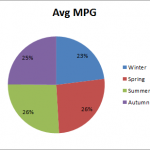
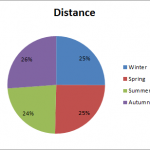
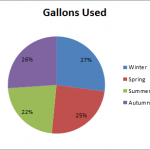
Looking at the charts it is interesting to see the differences in total driving distance by season. I wasn’t expected to see that, or if anything differed, I expected winter to involve fewer miles driven than other seasons. As I’d observed informally, the average MPG clearly changes during winter. I think increased Ethanol added by fuel companies during cold months is the likely culprit. Interesting that gas prices don’t reflect that lowered efficiency during the winter.
All told, even though I do 25% of my driving in the winter, I use 27% of the gas I purchase. Not a huge difference, but certainly not optimal. I should drive less in the winter to maximize my annual savings.
As I begin considering the purchase of a new car, I am less sure that a hybrid will be my top choice, especially since many small cars get good mileage, easily within 6 MPG (highway) of a lot of hybrids.
If others out there have had a significantly different experience with their hybrid I would be interested in hearing about it.
Tags: Civic Hybrid, fuel efficiency, hybrid car, linkedin, mileage, TCO, total cost of ownership
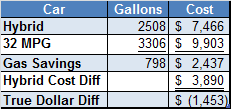
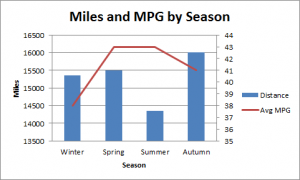
August 11th, 2011 at 23:18
Jim Manico (twitter:manicode) points out that with the federal tax credit for hybrid vehicles I would be in a more favorable financial position. A valid consideration, but unfortunately when I purchased my hybrid in 2007 the credit had been phased out for the Civic.